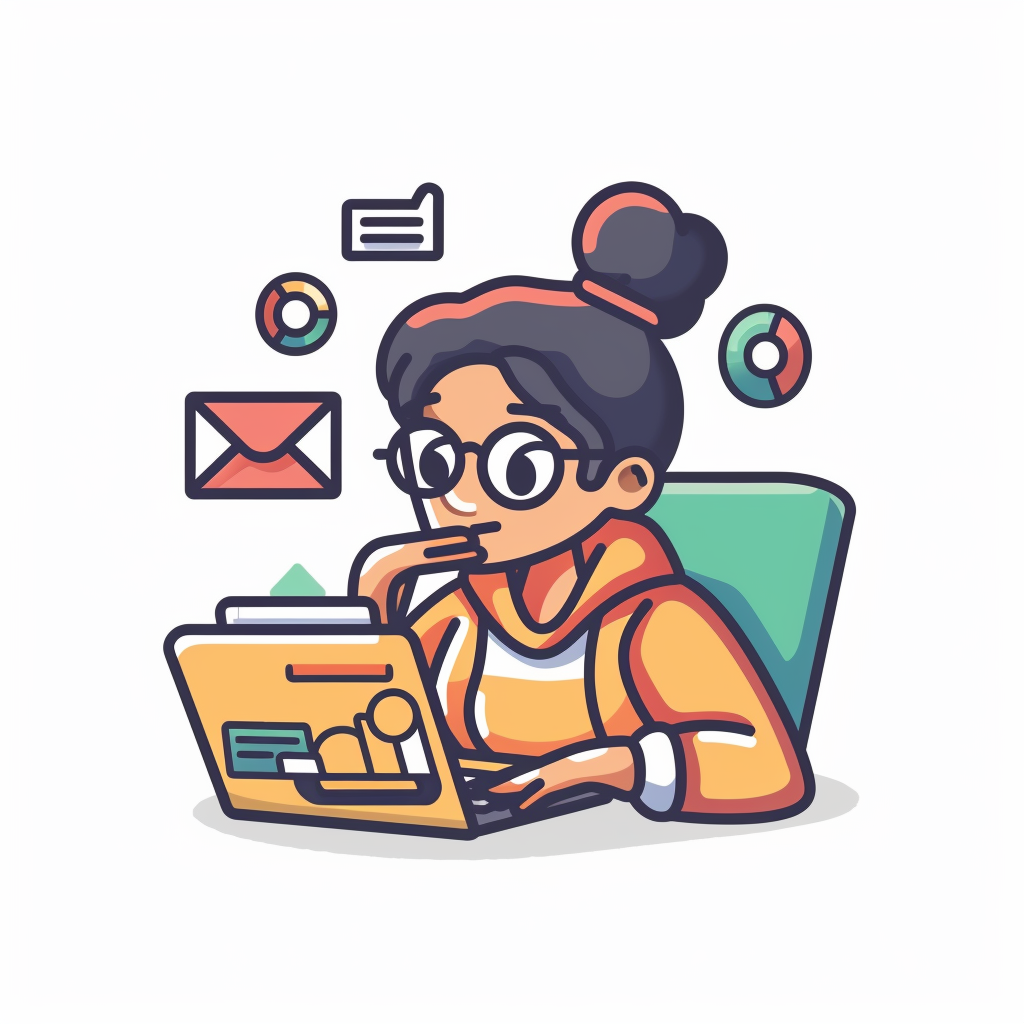To ace remote job interviews and stand out, start by ensuring your technology runs smoothly—test your internet speed and devices well in advance. Create a professional environment with good lighting and a tidy background. Master virtual communication by maintaining eye contact, using open body language, and actively listening. Research the company's values and culture so you can connect your experiences to their goals. Practice common interview questions to feel confident. In conclusion, follow up with a personalized thank-you email, showing genuine interest. By implementing these strategies, you'll elevate your chances of success and discover even more effective tips ahead.
Key Takeaways
- Test your technology and internet speed beforehand to ensure a smooth interview experience.
- Create a professional setting with good lighting and a tidy background to make a positive impression.
- Research the company's culture and connect your experiences to their values and mission during the interview.
- Maintain eye contact and use open body language to foster rapport and convey enthusiasm throughout the conversation.
- Send a personalized thank-you email within 24 hours to express appreciation and reiterate your interest in the position.
Prepare Your Technology
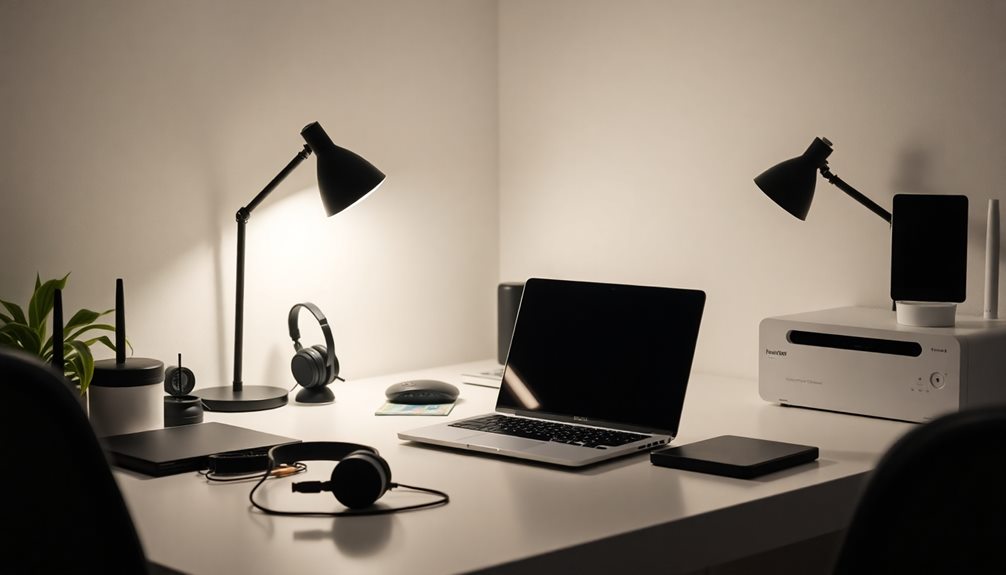
When it comes to remote job interviews, ensuring your technology is ready can make all the difference. You want to feel confident and focused, not stressed about a glitch in your setup. Start by checking your internet speed. A stable connection is essential for a smooth conversation. Run a speed test and aim for at least 25 Mbps for ideal video quality. If your internet provider can't guarantee this, consider finding a different location or upgrading your plan.
Additionally, joining a community like our tribe can provide you with resources to enhance your interview preparedness and access to expert advice.
Next, don't forget about backup devices. Life can be unpredictable, and you never know when your laptop might decide to act up. Have a backup device, like a tablet or smartphone, ready to step in if needed. It's also wise to install the necessary software on both devices in advance, so you can switch seamlessly if something goes wrong.
Additionally, test your microphone and camera well before the interview. Make sure they're working properly, and adjust your settings to enhance audio and visual clarity. You want your potential employer to see and hear you at your best.
Create a Professional Environment
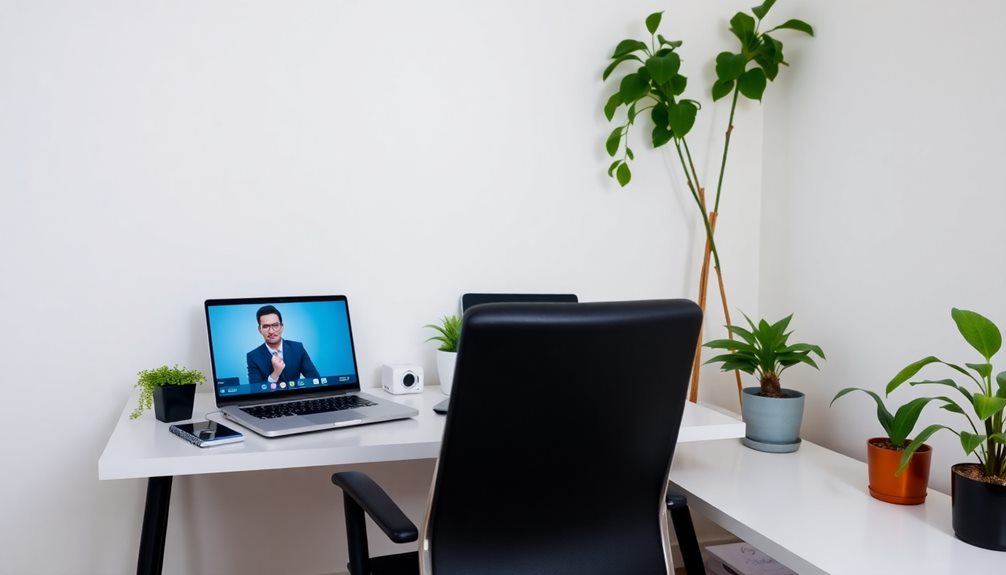
A professional environment sets the tone for your remote job interview and can greatly impact the impression you leave on potential employers. You want to create a space that reflects your professionalism and readiness. Start with your lighting setup; natural light is your best ally. Position yourself near a window if possible, as it illuminates your face and creates a warm ambiance. If natural light isn't an option, invest in a ring light or softbox to make sure you're well-lit. Avoid harsh overhead lights that can cast unflattering shadows.
Next, pay attention to your background decor. Choose a clean, uncluttered space that reflects your personality but remains professional. A simple bookshelf, a piece of artwork, or a plant can add a touch of warmth without being distracting. Make sure nothing controversial or overly casual is visible behind you. This subtle attention to detail can convey your respect for the interview process and the company.
Before your interview, take a moment to assess your setup. Sit down in your interview chair and view the background on your camera. Is it inviting? Does it portray your commitment and enthusiasm? If it doesn't, make adjustments until you're content.
Master Virtual Communication
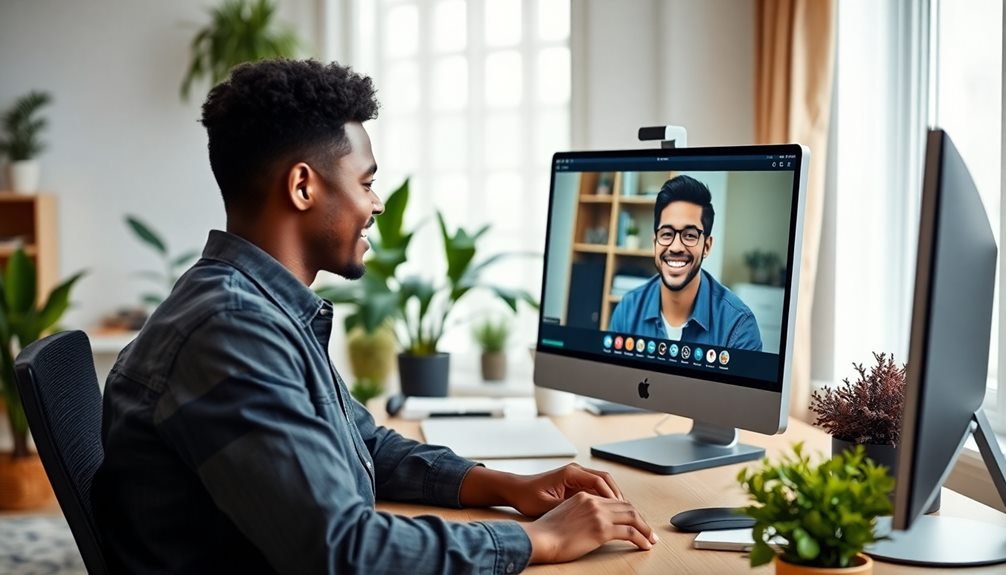
Mastering virtual communication is crucial for a successful remote job interview. You want to create an engaging and memorable impression, and that often boils down to how well you convey your message. Effective virtual communication involves not just what you say, but how you say it. Pay attention to your body language and vocal tone; they can speak volumes about your confidence and enthusiasm.
Here are some tips to help you shine:
- Maintain eye contact: Look into the camera to create a sense of connection with your interviewer.
- Use open body language: Sit up straight, avoid crossing your arms, and use hand gestures to emphasize your points.
- Modulate your vocal tone: Vary your pitch and pace to keep the conversation lively and engaging.
- Listen actively: Nod and respond appropriately to show you're engaged in the conversation.
In a remote setting, it's easy to become distracted or disengaged. By being mindful of your body language and vocal tone, you help foster a sense of belonging and connection, which is crucial for building rapport with your interviewer. Remember, they're not just evaluating your qualifications but also gauging how well you'll fit into their team.
Research the Company

Thorough research on the company can set you apart in a remote job interview. When you dive deep into understanding the company culture, you'll not only impress your interviewer but also find a way to align your values with theirs. Start by checking the company's website, social media channels, and employee reviews. Look for insights into their work environment, values, and mission. This knowledge will help you articulate why you're a good fit.
Next, familiarize yourself with industry trends. Knowing what's happening in the field shows that you're not just interested in the position but also in the bigger picture. It allows you to engage in meaningful conversations about how the company is adapting to changes and challenges. You can highlight your awareness of these trends during your interview, which demonstrates your proactive approach.
Connecting your background and experiences to the company culture and industry trends can create a powerful narrative about why you belong there. Use specific examples from your research to show how your skills can contribute to their goals. By demonstrating this knowledge, you'll show that you're invested in the role and have taken the time to understand how you can add value.
In a remote job interview, where competition is fierce, your research can be the key differentiator. It not only helps you answer questions with confidence but also fosters a genuine connection with your potential employer. So, take the time to research and let your passion shine through.
Practice Common Interview Questions

After you've researched the company and its culture, it's time to tackle one of the most essential aspects of your preparation: practicing common interview questions. This step is critical for building your confidence and helping you articulate your experiences effectively. Familiarize yourself with typical questions and rehearse your answers, focusing on your achievements and how they align with the role.
Here are some common interview questions you might encounter:
- Tell me about yourself.
- What're your greatest strengths and weaknesses?
Describe a challenging situation and how you handled it.
– Why do you want to work here?
While you practice, pay attention to your body language and eye contact. Even in a remote format, your non-verbal cues convey a significant message to your interviewer. Sit up straight, smile, and maintain eye contact with the camera to foster a connection. This will make you appear engaged and invested in the conversation.
Don't forget to rehearse out loud, ideally in front of a mirror or with a friend. This allows you to evaluate your tone and delivery, ensuring you sound authentic and passionate. Remember, it's okay to be yourself; authenticity is what helps you stand out.
Embrace this opportunity to showcase your unique qualities. With the right preparation and practice, you'll feel ready to not just answer questions but to connect with your interviewer and convey your genuine enthusiasm for the role.
Follow Up Effectively
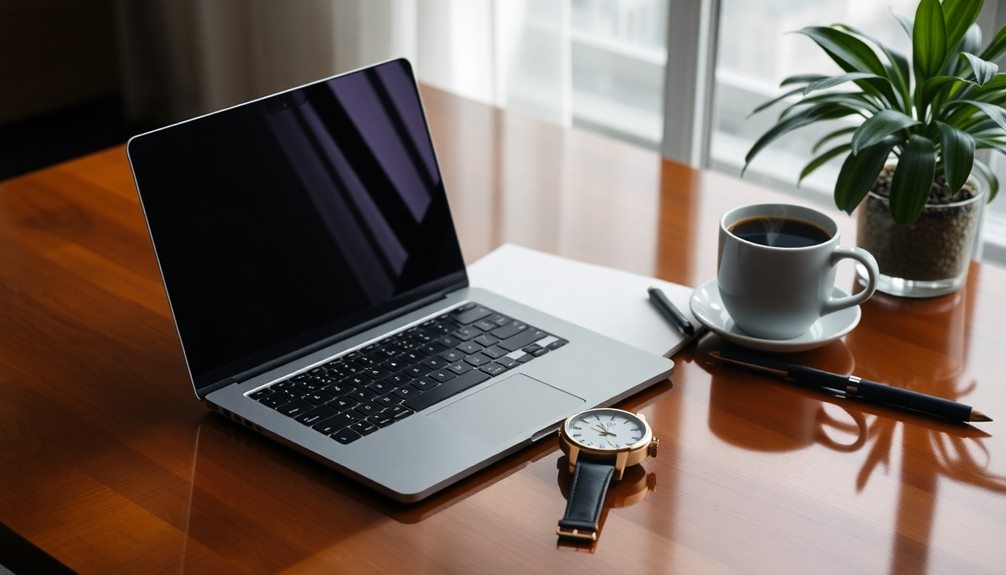
Following up effectively can be a game-changer after your remote job interview. It's your golden opportunity to reinforce your interest in the position and remind the interviewer of your unique fit. To make an impact, aim for timely follow-ups. Sending a thank-you email within 24 hours shows your enthusiasm and professionalism, and it keeps you fresh in their minds.
Your message should be a personalized one. Reference specific points from your interview to demonstrate your genuine engagement. For example, mention a shared interest or an insightful conversation you had. This not only highlights your active listening skills but also builds rapport, making you memorable.
When crafting your follow-up, keep it concise yet warm. Express gratitude for their time and reiterate why you're excited about the role. You might say something like, "I appreciated our discussion about the team's innovative projects, and I'm keen to contribute my skills to help drive those initiatives forward."
Remember, this isn't just a formality; it's part of your branding. A thoughtful follow-up can set you apart from other candidates and showcase your commitment to the role.
In a competitive job market, it's these little details that can make a big difference. So, embrace the follow-up process—it's your chance to shine and solidify your place in the team you hope to join. Don't underestimate the power of a well-crafted follow-up; it could be the key to accessing your dream job.
Frequently Asked Questions
What Should I Wear for a Remote Job Interview?
When deciding what to wear for your remote job interview, consider the dress code of the company. Opt for professional attire that reflects your seriousness and respect for the opportunity. Remember, virtual etiquette matters too; your appearance sets the tone.
Choose colors that convey confidence and look polished, even if they're just visible from the waist up. Showing you care about your presentation can help you feel more connected and prepared for success.
How Can I Build Rapport With the Interviewer Virtually?
Building rapport with your interviewer virtually can feel challenging, but it's totally doable!
Start with virtual icebreakers to lighten the mood—ask about their day or share a fun fact.
Maintain good video etiquette by keeping eye contact and showing genuine interest.
Focus on engaging conversation, listening actively, and responding thoughtfully.
Should I Have Notes or a Resume Handy During the Interview?
Having notes or a resume handy during the interview can be beneficial. Just make sure you don't rely too heavily on them. Use your notes to jog your memory, but focus on maintaining good body language and making eye contact. This balance shows your confidence and engagement.
How Do I Handle Unexpected Technical Issues During the Interview?
When unexpected technical issues arise during your interview, stay calm and focused. You can rely on troubleshooting solutions, like restarting your device or switching to a backup connection. Communicate your situation clearly and confidently; most interviewers appreciate your transparency. Remember, it's okay to ask for a moment to resolve the issue.
What Are Some Unique Questions to Ask the Interviewer?
When you step into an interview, channel your inner Socrates—ask questions that provoke thought. From the interviewer's perspective, inquire about their favorite company culture aspect or how they handle behavioral scenarios in team dynamics.
Follow up questions like, "What challenges have shaped your team's goals?" show your engagement. This not only highlights your curiosity but also fosters a sense of belonging, making the conversation feel more like a partnership than a mere evaluation.
Conclusion
To truly stand out in remote job interviews, remember that 80% of hiring managers prioritize communication skills over technical expertise. By honing your virtual communication and preparing thoroughly, you can showcase your unique strengths. Embrace the opportunity to demonstrate your adaptability and professionalism in this digital landscape. With the right mindset and preparation, you're not just a candidate; you're a standout contender. So gear up, stay confident, and let your personality shine through every interaction!
